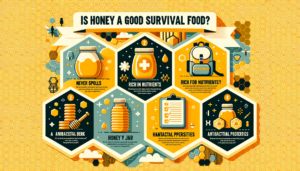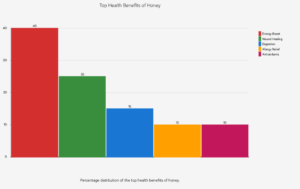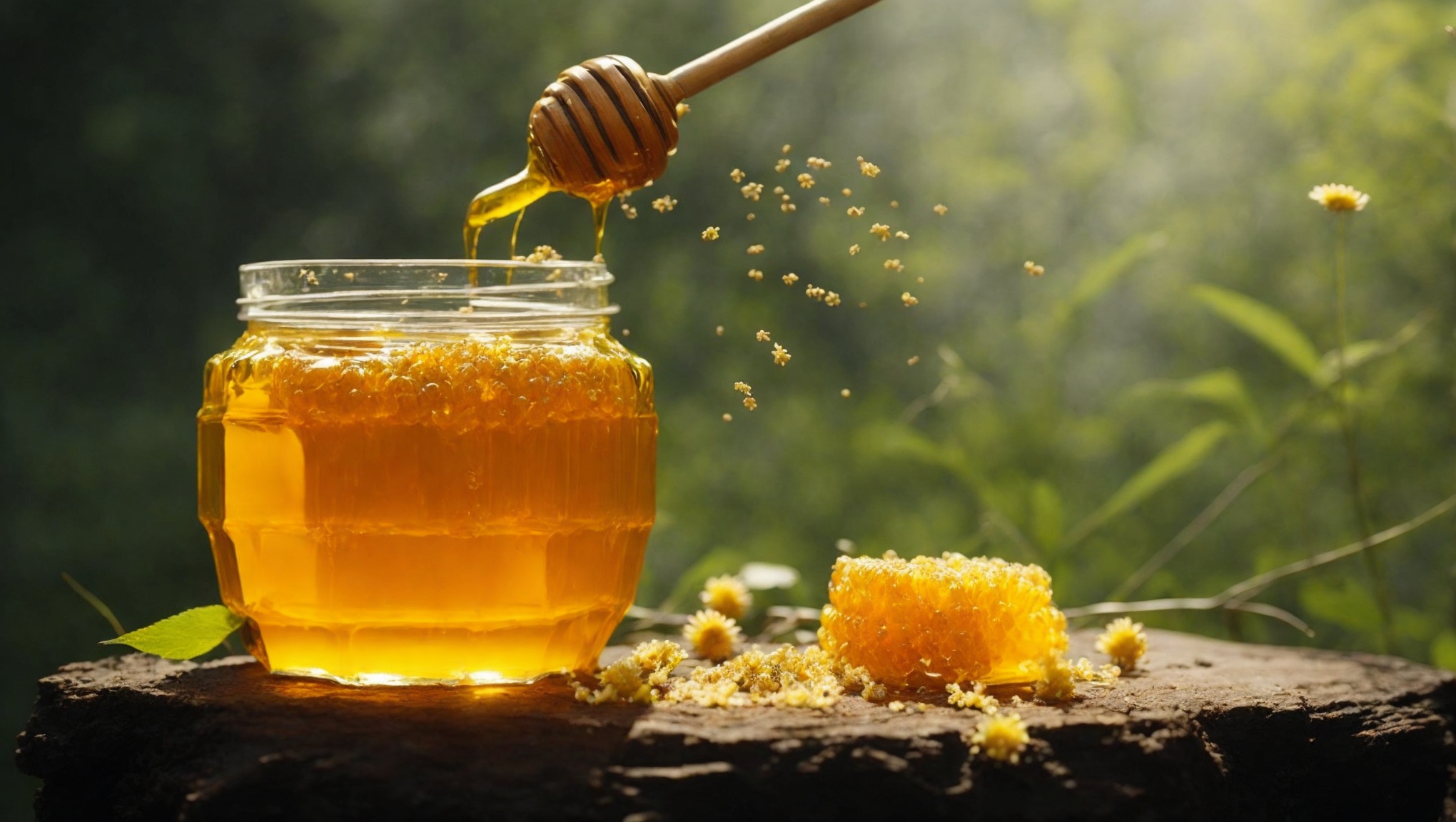Are you intrigued by the potential perks of honey as a survival food?
Well, guess what?
This captivating article will take you on a thrilling adventure through the enchanting qualities that make honey an absolute gem for all you survival enthusiasts out there.
As you embark on your self-sufficient escapades and diligently prepare for anything, it becomes imminent that you grasp the sheer significance of survival food.
It’s not just any ordinary sustenance; it’s a lifeline!
So, brace yourselves as we unravel the mysteries of honey’s extraordinary shelf life, its mind-blowing nutritional value, and its ingenious applications that will leave you in awe.
Get ready to be convinced why honey rules the roost when it comes to your survival stockpile.
Buckle up, folks! It’s time to explore the whimsical wonders of unadulterated honey and how it can come to your rescue during your gripping survival saga.
We will discuss the shelf life, nutritional value, and various uses of honey, demonstrating why it is a must-have for your survival supply.
So, let’s explore the wonders of raw honey and how it can support your survival journey.

| Property of Honey | Description |
|---|---|
| Eternal Shelf Life | Honey never spoils due to its low water content and high acidity, making it bacteria-resistant. Ancient pots of honey, thousands of years old, have been found still edible. |
| Nutritional Powerhouse | Rich in sugars for quick energy and contains trace amounts of vitamins, minerals, and antioxidants essential for maintaining good health. |
| Unique Healing Properties | Historically used for its medicinal properties. Acts as a topical treatment for cuts and burns, aiding in healing and preventing infection. |
| Natural Energy Booster | Provides a quick source of energy, essential in survival situations requiring stamina and endurance. |
| Antibacterial Properties | Especially potent in some varieties like Manuka honey. Can be a remedy for ailments, soothe sore throats, and act as a natural cough suppressant, making it valuable in the absence of medicine. |
Is Honey a Good Survival Food?
When it comes to survival situations, having access to the right type of food is crucial. Building a stockpile of long-lasting, nutritious, and versatile food options is essential for any prepper or survivalist.
One food item that often comes up in discussions is honey.
Not only is honey a delicious natural sweetener, but it also offers numerous health benefits and has a long shelf life.
In this article, we will delve into the nutritional value of honey, its calorie content, medical uses, antibacterial properties, versatility, ease of storage and portability, and why it is an economical choice for survival situations.
We will also discuss how to source honey in a survival situation.
This pie chart showcases the distribution of popular honey types based on global consumption.

Nutritional Value of Honey
Listen up, folks!
Honey isn’t just some sugary delight, oh no. It’s practically a superfood packed to the brim with all the good stuff your body needs.
We’re talking about a whole bunch of vitamins and minerals like vitamin C, calcium, potassium, and iron.
You know, the stuff that keeps your immune system strong, your bones healthy, your blood pressure in check, and prevents you from becoming a human raisin.
But that’s not all, honey lovers! It also boasts a bonus feature: antioxidants.
These little warriors go to war against those pesky free radicals that want to wreak havoc on your body.
Consider them your personal bodyguards, shielding you from harm.
So, next time you drizzle honey on your toast, know that you’re not just satisfying your sweet tooth, but also giving your body a power-packed dose of essential nutrients and protection.
Honey, you’re a superhero in disguise!
Long Shelf Life
Honey, the ultimate survival food, reigns supreme with its incredible ability to outlast the ages.
Stored wisely in a chilly, bone-dry locale, honey can laugh in the face of time, defying expiration dates and maintaining its utmost deliciousness.
Just picture this: ancient Egyptian burial sites, decked out with pots of honey that have weathered the passage of centuries.
And guess what?
They’re not just pretty relics.
These golden treasures are still fit for consumption, ready to tantalize taste buds with their timeless allure.
So go ahead, hoard honey to your heart’s content! No need to fret about spoilage or nutrient loss.
This nectar of the gods will forever remain a steadfast companion on your survival journey.
Calorie Content
When it comes to survival, you gotta make sure you have some high-calorie goodies on hand to keep you going and feeling satisfied.
Enter honey.
This sticky, sweet nectar packs a mighty punch with around 64 calories per tablespoon.
Talk about a powerhouse of energy!
So next time you find yourself in a sticky situation without access to your usual grub,reach for that jar of honey and let its high calorie content keep you powered up and ready to conquer whatever comes your way.
Medical Uses
Honey, the golden elixir of health, has been hailed for its healing powers since time immemorial.
This glorious nectar boasts magnificent abilities beyond mere sustenance, flaunting its impressive antibacterial, antiviral, and antifungal charms that work wonders in combating a plethora of afflictions.
When applied externally, honey becomes a miraculous balm for wounds, burns, and cuts, bestowing the gift of accelerated tissue regeneration and warding off menacing infections.
And lo and behold, when sipped orally, this delightful amber potion magically transforms into an enchanting cure for pesky coughs and nagging sore throats.
Honey truly reigns supreme as nature’s own remedy.

Antibacterial Properties
Honey isn’t just a sweet treat.
It’s been our trusty go-to for centuries when it comes to healing wounds naturally.
Whenever we pull out the honey for cuts, burns, or infections, it puts up a safeguard that stops bacteria from setting up camp.
On top of that, it even eases inflammation and fast-tracks the whole healing process.
Scientific studies have revealed honey’s impressive talent for wiping out all sorts of bacteria, even those pesky antibiotic-resistant ones like MRSA.
Talk about a superhero substitute for regular antibiotics.
And that’s not all. Honey’s got this special sugar-packed, water-light combo going on that completely harshes bacteria’s groove.
You see, bacteria need water to thrive and multiply, but honey’s low water content effectively shuts down their party.
But wait, there’s more! Honey is also armed with enzymes that produce hydrogen peroxide, a super-strong antiseptic.
This miracle compound sweeps away bacteria and keeps infections at bay.
So, when you find yourself stranded in the wild, and your H2O supply is running dry, nature’s sweet nectar can step up as an antibacterial hero, fending off those pesky germs and keeping you squeaky clean.
In a nutshell, honey isn’t just a sticky delight – it’s a multitasking lifesaver for curing wounds and fighting off bacteria.
This bar chart represents the percentage distribution of the top health benefits of honey.

Versatile Use
Honey, oh honey, you are truly a lifesaver when it comes to survival.
Why, you may ask?
Well, let me enlighten you with your delightful versatility.
Not only can you be devoured straight from the jar to satisfy our sweet tooth or boost our energy levels, but you also work wonders in the kitchen.
Yes, you heard it right, honey! You can be a star in cooking, baking, and even replace those dreadful processed sugars.
You have the power to add a delightful touch of sweetness to our cup of tea or coffee, elevate the humble oatmeal or cereal to another level of deliciousness, and even transform into a delectable glaze for meat and veggies.
Your natural sweetness and unique flavor have the incredible ability to enhance the taste of any dish, making you the ultimate ingredient for creating an array of mouthwatering meals.
Oh honey, you truly are a culinary marvel!
Ease of Storage and Portability
Honey’s compact and lightweight nature make it an ideal food for survival situations.
Unlike canned goods or bulky items, honey takes up minimal space and can be easily stored in a backpack or emergency kit.
Honey’s convenient and puny dimensions make it the ultimate chow for dire straits.
Say goodbye to those hefty cans and gargantuan necessities, because honey occupies a minuscule amount of room and can effortlessly be stashed away in a backpack or emergency kit.
Bid farewell to the need for extra cooking tools or prepping hassles, because honey’s liquid state makes it the go-to choice for easy peasy sustenance while on the move.
Whether you’re fleeing the scene or hunkering down, honey’s small size and portable nature make it a priceless addition to any survival food collection.
Economical Choice
When it comes to preparing for survival situations, every penny counts.
When it comes to getting ready for doomsday scenarios, it’s all about being a savvy spender.
Honey, my friend, is the economical champ when it comes to bulking up your food supply.
With its impressive lifespan, you won’t be sweating about constantly restocking it.
And its super versatile nature means you can get crafty in the kitchen without needing a ton of other ingredients.
By including honey in your survival food collection, you’re not just being resourceful, you’re squeezing every last drop out of your hard-earned cash.
By choosing honey as part of your survival food stash, you can ensure that you are maximizing your resources and getting the most bang for your buck.

Sourcing Honey in a Survival Situation
When you find yourself in a dire situation, forget about buying honey like a basic bee-loving pleb.
You’re gonna have to get creative.
Unfortunately, stumbling upon wild beehives is a risky move because those bees can get a real attitude when you mess with their homes.
But, if you happen to be a badass beekeeper with skills in the game, why not think about setting up your own little honey haven?
That way, you’ll always have a sweet stash at your disposal.
If that’s not an option, don’t sweat it.
There are some plant species, like the manuka tree, that know how to produce honey without causing a buzz with the bees.
So, go ahead and dip your finger into nature’s natural honey pot.
This line chart depicts the trend of honey production globally from 2018 to 2022.

To wrap it up, honey is the real deal when it comes to survival grub.
With its essential nutrients, everlasting existence, mega calorie count, medicinal perks, germ-fighting abilities, adaptability, hassle-free storage and portability, and money-saving qualities, this golden goodness ticks all the boxes.
Whether you gobble it up for an instant power-up or whip up some homemade remedies, honey is your go-to in sticky situations.
Consider adding honey to your emergency food supply to ensure you have a reliable source of sustenance and a natural sweetener that can last for years.
Frequently Asked Questions
1. How long does honey last as a survival food?
Honey has an indefinite shelf life when stored properly.
While commercial or processed honey may have a shelf life of approximately two years, natural, well-preserved, and properly stored honey can remain stable for decades or even centuries.
2: What makes honey a good choice for survival food?
Honey is an excellent survival food because it is nutritious, calorie-dense, and has a long shelf life.
Additionally, honey has antibacterial properties, making it valuable in a survival situation.
3. How should I store honey for long-term survival use?
To preserve honey in its best form, store it under 80 degrees Fahrenheit for granulated honey, or similar conditions for other types.
It’s crucial to maintain humidity below 70 percent and store honey in a sealed container to prevent contamination. Keep the honey away from direct sunlight to avoid degradation.
4. What types of honey are best for long-term storage?
The best honey for long-term storage is the one you like the taste of and one that won’t crystallize too quickly.
Among common types are Comb Honey, Raw Honey, Creamed Honey (granulated honey), and Chunk Honey.
Creamed honey is often recommended as it maintains a well-balanced composition and is not over-processed.
5. How much honey should I store for a year of survival preparedness?
The quantity of honey to store depends on individual preferences and needs. Generally, up to five liters of honey for two individuals may suffice for a year for heavy users.
For average consumption, about 2 liters per individual should be adequate.
6. Can an individual survive solely on honey in a survival situation?
While an individual can survive on honey alone for a limited time, it is not recommended for prolonged periods. Honey is mainly composed of sugars and lacks a balanced diet.
Prolonged consumption may lead to undesirable side effects such as abdominal discomfort.
7. Why does honey have such a long shelf life?
Honey’s extended shelf life is attributed to an enzyme found in the stomach of bees.
This enzyme makes honey acidic, inhibiting the growth of bacteria and preserving it over time.
8. What other foods have an indefinite shelf life for survival purposes?
Besides honey, several other foods can last indefinitely, including unseasoned salt, alcohol, powdered milk, ghee, dried lentils, and corn starch.
Soy sauce can also last indefinitely if unopened due to its high salt content.
9. Which honey types taste best for consumption and storage?
Creamed honey is often recommended for long-term storage because of its well-balanced composition and taste. It retains its natural state and doesn’t crystallize quickly.
10. Where is the best place to purchase honey for my survival stores?
The specific place to buy honey is less important than the type of honey you choose. Look for raw, unfiltered honey, which tends to keep the longest. Online platforms like Amazon offer convenient options for purchasing honey.
These FAQ questions and answers provide valuable information about honey as a survival food and how to store it effectively for long-term use.
I’m Alex, the author behind True Survivalist. As a survival enthusiast myself, I’ve created this website to serve as a valuable resource for fellow survivalists and preppers. Whether it’s understanding survival situations, emergency preparedness, or finding the right survival gear, I’ve got you covered. Through a series of informative guides, I aim to provide answers to commonly asked questions, debunk common myths, and help you avoid common mistakes. At True Survivalist, I believe in equipping you with the knowledge and tools you need to be prepared for any survival scenario. Join me on this journey of self-reliance and resilience.

